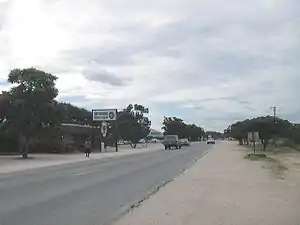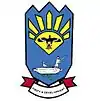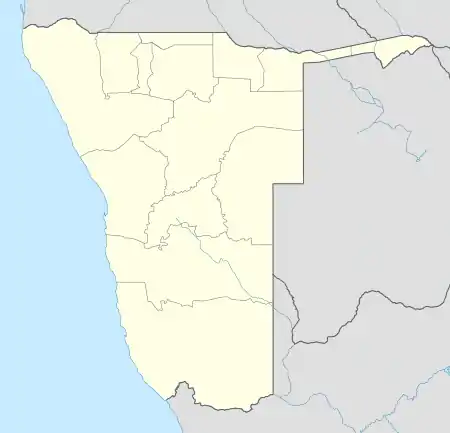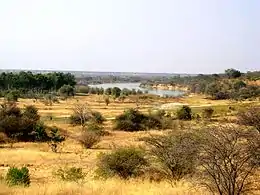Rundu
Rundu is the capital of the Kavango-East Region, northern Namibia, on the border with Angola on the banks of the Kavango River about 1,000 metres (3,300 feet) above sea level. Rundu is growing rapidly. The 2001 census counted 36,964 inhabitants;[2] and for the 2011 census it has climbed to 63,430.
Rundu | |
|---|---|
Town | |
 Eugene Kakururu Street | |
 Seal | |
| Nickname(s): Ru-town | |
| Motto(s): Unity & Development | |
 Rundu Location in Namibia | |
| Coordinates: 17°55′S 19°46′E | |
| Country | |
| Region | Kavango-East Region |
| Constituency | Rundu Urban constituency |
| Government | |
| • Type | Swapo Party |
| • Mayor | Verna Mpingana Sinimbo (SWAPO) |
| Elevation | 1,095 m (3,593 ft) |
| Population (2011)[1] | |
| • Total | 63,431 |
| Time zone | UTC+2 (SAST) |
| Area code(s) | 066 |
| Climate | BSh |
| Website | http://www.runducity.iway.na/ |
History
In 1936 it became seat of the local governor as it replaced Nkurenkuru as capital of the Kavango district. The town has since grown into a multilingual city of the Kavango region by then now is for Kavango East and only recently its official status was changed to that of a town.[3]
Since 1993, its St. Mary's Cathedral is the episcopal seat of the Roman Catholic Apostolic Vicariate of Rundu.
Politics
Rundu is governed by a town council that has seven seats.[4]
The 2015 local authority election was won by SWAPO which gained five seats (6,973 votes). One seat each went to the local Rundu Concerned Citizens Association (1,043 votes) and the All People's Party (APP, 973 votes).[5] SWAPO also won the 2020 local authority election, obtaining 3,548 votes and gaining four seats. One seat each went to the Rundu Concerned Citizens Association (863 votes), the Rundu Urban Community Commission (386 votes), and the Independent Patriots for Change (IPC), an opposition party formed in August 2020, that gained 321 votes.[6]
Geography
Localities
Many of Rundu's residents live in shacks. In 2020 the town had a total of 18,219 of these informal housing structures, accommodating more than 76,000 inhabitants,[7] more than the most recent (2011) census reported as total population figure.
The oldest houses in Rundu are located in the Katutura area. These houses are mainly two bedroom homes with large backyards even though they are situated next to the central business district.
On the west is Tutungeni, which means "let's build". This area was previously occupied by executives of the white-dominated businessplace, but now it is open for any willing buyer in need of a quiet neighbourhood. On the East is Safari. There are the middle-priced houses built in the 1970s.
These three main localities dominated Rundu residential life until the turn of the millennium in 2000, when new housing projects by O'B Davids Properties built a new residential area called Millennium Park. After which two others have been built by the NHE, Queens and Kings Parks respectively. Recently a new formal location was added called Rainbow
Outside the formal suburbs, shanty towns symbolise the rapid urbanisation of the town and high unemployment rates. Kehemu (Ghetto), Kaisosi (also known by the locals as Cali), Sauyemwa (SA), and Ndama are the most informal areas while a fourth, Donkerhoek (Dark Corner), is rapidly becoming formal since the start of the Build Together Campaign in 1992.
Climate
| Rundu | ||||||||||||||||||||||||||||||||||||||||||||||||||||||||||||
|---|---|---|---|---|---|---|---|---|---|---|---|---|---|---|---|---|---|---|---|---|---|---|---|---|---|---|---|---|---|---|---|---|---|---|---|---|---|---|---|---|---|---|---|---|---|---|---|---|---|---|---|---|---|---|---|---|---|---|---|---|
| Climate chart (explanation) | ||||||||||||||||||||||||||||||||||||||||||||||||||||||||||||
| ||||||||||||||||||||||||||||||||||||||||||||||||||||||||||||
| ||||||||||||||||||||||||||||||||||||||||||||||||||||||||||||
Rundu has a hot semi-arid climate (Köppen: BSh), with hot summers and relatively mild winters (with warm days and chilly to cool nights). Even though it has a hot semi-arid climate, the area experiences high diurnal temperature variation during the winter with average high temperatures at roughly 26 °C (79 °F) and average low temperatures at 6 °C (43 °F). This large swing in daily temperature is more commonplace among areas with cold semi-arid climates. During the summer, the diurnal temperature variation is less pronounced. The average annual precipitation is 568 mm (22 in),[8] although in the 2010/2011 rainy season 757 millimetres (29.8 in) were measured.[9]
Economy and infrastructure
Rundu Open Market
Rundu Open Market is the most well-known and biggest open market in the town. It was founded in 1996 through cooperation between the government of Namibia and the government of Luxembourg.[10][11][12]
Transport

Rundu Airport, mostly used for tourism and cargo, is 5 kilometres (3.1 miles) southwest of the town.[13]
The Rundu State Hospital is situated in the center of the town, off Markus Siwarongo street. It's the largest hospital in Kavango East.
Military
There is a military base of the Namibian Defence Force in Rundu. Built in 1972 and expanded in 1976, while South West Africa was under South African occupation, it houses 1,600 soldiers.[14] The base was named Voito Jason Kondjeleni Military Base, after People's Liberation Army of Namibia (PLAN) fighter Voito Jason Kondjeleni who died in 1983.[15]
Education and Culture
Rundu is home to many woodcarvers [16] and features a woodcarver's market near the open market. Several local restaurants serve traditional food, including mahangu, ground nuts, stewed meats, and fish from the Okavango River.
Schools
There are five tertiary Institutions in Rundu, namely the Rundu College of Education, the Institute of Open Learning (IOL), the Rundu Vocational Training Centre, the Namibia College of Open Learning (NAMCOL) and Triumphant College. The University of Namibia and Polytechnic of Namibia both maintain centres that provide support for students who are studying on distance. There are six secondary schools in the town: Rundu Secondary School, Dr. Alpo Mbamba Secondary School, Dr. Romanus Kampungu Secondary School, Elias Neromba Senior Secondary School, Noordgrens, and Kamunoko Secondary School.
Twin towns – sister cities
Rundu is twinned:
References
- "Table 4.2.2 Urban population by Census years (2001 and 2011)" (PDF). Namibia 2011 - Population and Housing Census Main Report. Namibia Statistics Agency. p. 39. Retrieved 24 August 2016.
- Republic of Namibia 2001 Population and Housing Census (Basic Analysis with Highlights ed.). Windhoek: Central Bureau of Statistics, National Planning Commission. July 2003. p. 21. ISBN 0-86976-614-7.
- Heussen, Sven (7 July 2010). "Revisionsurteil verweigert. Generalbuchprüfer rügt Dorfrat von Rundu – Chaos in der Verwaltung" [Internal audit refused. Auditor-General admonishes Rundu Village Council – Administration in chaos]. Allgemeine Zeitung (in German).
- "Know Your Local Authority". Election Watch (3). Institute for Public Policy Research. 2015. p. 4.
- "Local elections results". Electoral Commission of Namibia. 28 November 2015. p. 4. Archived from the original on 10 December 2015.
- "2020 Local Authority Elections Results and Allocation of Seats" (PDF). Electoral Commission of Namibia. 29 November 2020. p. 8. Retrieved 14 January 2021.
- Nghinomenwa, Erastus (12 August 2020). "Namibia's ghetto life: Half million live in shacks countrywide". The Namibian. p. 1.
- Menges, Werner; Oliveira, Yokany (23 May 2019). "Khomas faces worst drought in 90 years". The Namibian. p. 1.
- Menges, Werner (26 May 2011). "Rainy season was one for the record books". The Namibian. Archived from the original on 15 December 2011.
- RunduOpenMarkets.org/
- Namibia (Other Places Travel Guide) by Jeremiah Allen
- Kavango Women Keep Pots Boiling New Era, 16 February 2005
- Namibia Airports Company Rundu
- Deckers, Florian (29 November 2016). "MPs recommend demolition of Rundu base". The Namibian. p. 5.
- "Army base renamed after PLAN fighter". New Era. 5 September 2014.
- Namibia: Woodcarvers of the Kavango by Fifi Rhodes. AllAfrica. 12 April 2012.
| Wikimedia Commons has media related to Rundu. |
